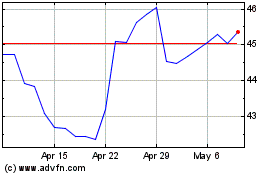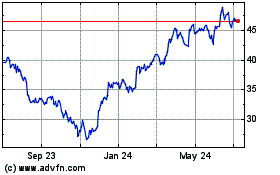By Mike Colias in Detroit and Yoko Kubota in Beijing
General Motors Co. posted its biggest-ever sales drop in China
last year and warned of another tough year ahead, underscoring the
challenges that U.S. car makers are facing as the world's largest
auto market suffers its first protracted decline in nearly three
decades.
GM said Tuesday that it sold about 3.09 million vehicles last
year in China, its biggest overseas market, roughly a 15% drop from
2018. It was the second straight year of falling sales in China. In
2018, sales slumped about 10% -- the company's first-ever decline
there.
The Detroit company doesn't expect things to improve quickly.
"We expect the market downturn to continue in 2020, and anticipate
ongoing headwinds in our China business," said Matt Tsien, an
executive vice president who leads the auto maker's business in
China. GM is focused on cost-cutting and improving its product
lineup, he said.
China's overall auto market, once a reliable source of growth
for global auto makers, started contracting in July 2018 and has
since become a trouble spot for many companies.
While many foreign and domestic auto makers have struggled as
China's economy slows and auto subsidies expire, U.S. companies,
including GM and rival Ford Motor Co., have fared particularly
poorly.
Both American auto makers have pointed to poor sales of older
models, and have vowed to revitalize their lineups in China with
new offerings. Ford has lost money in China over the past two years
after a stretch of profits. GM was on pace to earn more than $1
billion in China in 2019, though that would be down significantly
from recent years.
Still, many car companies are betting on China's size and growth
potential, particularly in electric vehicles, which Beijing
supports through regulations and incentives.
Tesla Inc., another U.S. auto maker, said Tuesday that it plans
to build its Model Y compact sport-utility vehicle at its Shanghai
plant, in a move to expand the electric-car maker's production
capabilities and boost sales in China.
For Tesla, production in China represents a significant growth
opportunity, following the company's reliance on imported cars to
feed the market. China looms large in Tesla's future strategy,
especially with sales growth easing in the U.S., where the company
recently lost a U.S. tax credit that effectively lowered the price
of its vehicles.
GM and Ford also plan to sell several electric models in China,
though those vehicles will account for a sliver of their overall
businesses. Meanwhile, they are trying to spark growth for their
traditional brands in a crowded market. Sales of GM's Chevrolet
brand, for example, fell 20% in China last year.
Through the first 11 months of 2019, the combined market share
for U.S. companies shrank by 1.5 percentage points, while those of
German and Japanese car makers grew, according to data from the
state-backed China Association of Automobile Manufacturers.
Full-year data is expected Jan. 13.
GM, the second-largest foreign auto maker in China by sales in
2018, after Volkswagen AG, has now suffered six straight quarters
of sales declines there in year-over-year terms.
Meanwhile for Ford, its sales in China for the third quarter of
2019 tumbled 30%. After its disappointing third-quarter earnings
report, Ford cut its full-year profit outlook for 2019, citing
higher warranty costs, bigger discounts and weaker-than-expected
performance in China. The Dearborn, Mich., auto maker is set to
release its 2019 full-year results for China in the coming
days.
GM's troubles in China come as the auto maker confronts slowing
sales at home. In 2019, it sold nearly 2.9 million vehicles in the
U.S., a 2.3% decline compared with 2018.
In late October, GM executives blamed this year's sales downturn
in China on overall market volatility and weak demand for the
company's older models that are being phased out. In China, GM has
a joint venture with the country's largest car maker, SAIC Motor
Corp, with which it manufactures Buick, Chevrolet and Cadillac
passenger vehicles.
Chief Executive Mary Barra told analysts that the company is
introducing new vehicles in China that she hopes will lift sales,
including a small Chevrolet sport-utility vehicle called the
Trailblazer and a large SUV, the Cadillac XT6.
She said the auto maker hadn't detected any negative sentiment
from consumers related to the U.S.-China trade tensions. Through
the first three quarters of 2019, GM earned about $893 million from
China, nearly half of the $1.7 billion it earned in the same period
a year earlier.
Luxury brands have generally performed well despite the market
downturn, and in 2019, sales of GM's upscale Cadillac brand rose to
a record 213,717 vehicles in China, a 3.9% increase from 2018.
Many industry experts said China's auto market is likely to
decline further this year. The China Association of Automobile
Manufacturers estimates the market will fall 2% in 2020.
--Yin Yijun in Shanghai contributed to this article.
Write to Mike Colias at Mike.Colias@wsj.com and Yoko Kubota at
yoko.kubota@wsj.com
(END) Dow Jones Newswires
January 07, 2020 14:54 ET (19:54 GMT)
Copyright (c) 2020 Dow Jones & Company, Inc.
General Motors (NYSE:GM)
Historical Stock Chart
From Mar 2024 to Apr 2024

General Motors (NYSE:GM)
Historical Stock Chart
From Apr 2023 to Apr 2024
